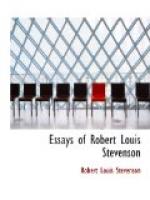Now, this is one of the natural appetites with which any lively literature has to count. The desire for knowledge, I had almost added the desire for meat, is not more deeply seated than this demand for fit and striking incident. The dullest of clowns tells, or tries to tell, himself a story, as the feeblest of children uses invention in his play; and even as the imaginative grown person, joining in the game, at once enriches it with many delightful circumstances, the great creative writer shows us the realisation and the apotheosis of the day-dreams of common men. His stories may be nourished with the realities of life, but their true mark is to satisfy the nameless longings of the reader, and to obey the ideal laws of the day-dream. The right kind of thing should fall out in the right kind of place; the right kind of thing should follow; and not only the characters talk aptly and think naturally, but all the circumstances in a tale answer one to another like notes in music. The threads of a story come from time to time together and make a picture in the web; the characters fall from time to time into some attitude to each other or to nature, which stamps the story home like an illustration. Crusoe[13] recoiling from the footprint, Achilles shouting over against the Trojans, Ulysses bending the great bow, Christian running with his fingers in his ears, these are each culminating moments in the legend, and each has been printed on the mind’s eye forever. Other things we may forget; we may forget the words, although they are beautiful; we may forget the author’s comment, although perhaps it was ingenious and true; but these epoch-making scenes, which put the last mark of truth upon a story and fill up, at one blow, our capacity for sympathetic pleasure, we so adopt into the very bosom of our mind that neither time nor tide can efface or weaken the impression. This, then, is the plastic part of literature: to embody character, thought, or




